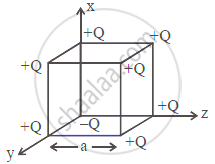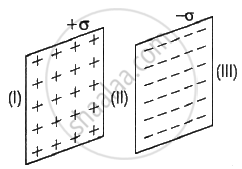Advertisements
Advertisements
प्रश्न
Solve numerical example.
Calculate the electric field due to a charge of −8.0×10−8 C at a distance of 5.0 cm from it.
उत्तर
Given: q = −8.0×10−8 C, r = 5 cm = 5 × 10−2 m
To find: Electric field (E)
Formula: E = `1/(4πε_0)"q"/"r"^2`
Calculation: From formula,
E = `9xx10^9xx((-8xx10^-8))/(5xx10^-2)^2`
= −2.88 × 105 N/C
Electric field due to a charge is −2.88 × 105 N/C.
APPEARS IN
संबंधित प्रश्न
Choose the correct option.
Which of the following produces uniform electric field?
Answer the following question.
What is a uniform electric field?
Answer the following question.
If two lines of force intersect of one point. What does it mean?
Solve numerical example.
Four charges of + 6×10-8 C each are placed at the corners of a square whose sides are 3 cm each. Calculate the resultant force on each charge and show in the direction and a diagram drawn to scale.
A conducting sphere of radius R = 20 cm is given a charge Q = 16 µC. What is `vecE` at centre?
The number of electrons to be put on a spherical conductor of radius 0.1 m to produce an electric field of 0.036 N/C just above its surface is ____________.
An electron is moving towards X-axis. An electric field is along Y-direction then path of electron is ____________.
An electron at rest is accelerated by a potential 'V1', in uniform field experiences a force 'F1'· When potential is changed to 'V2', the force experienced by the electron gets doubled. The ratio of V1 to V2 is ______.
An electron experiences a force equal to its weight, when placed in an electric field. The intensity of the field will be ______.
Radius of a metal sphere is 4 cm. It is given a charge of 8 µC. The force acting on unit area of its surface is ____________.
Two parallel plates separated by 'd' mm are kept at potential difference of 'V' volt. A particle of mass 'm' and charge 'q' enters in it with some velocity. The acceleration of the particle will be ______.
Electric field at the centroid of a triangle carrying q charge at each comer as
Dimensional formula for electrical field is ______
A cube of side 'a' has point charges +Q located at each of its vertices except at the origin where the charge is -Q. The electric field at the centre of cube is ______.

A copper ball of density 8.6 g/cm3, 1 cm in diameter is immersed in oil of density 0.8 glcm3. The charge in µC on the ball, if it remains just suspended in an electric field of intensity 3600 V/m acting in upward direction is ______ µC.
A positive charge particle of 100 µg is thrown in opposite direction to a uniform electric field of strength 1 × 105 NC-1. If the charge on the particle is 40 µC and the initial velocity is 200 ms-1, how much distance it will travel before coming to the rest momentarily:
An oil drop of radius 2 mm with a density 3 g cm-3 is held stationary under a constant electric field 3.55 × 105 V m-1 in the Millikan's oil drop experiment. What is the number of excess electrons that the oil drop will process?
Consider g = 9.81 m/s2
An inclined plane makes an angle of 30° with the horizontal electric field E of 100 V/m. A particle of mass 1 kg and charge 0.01 C slides down from a height of 1 m. If the coefficient of friction is 0.2, the time taken for the particle to reach the bottom is ______ sec.

The expression for electric field intensity at a point outside uniformly charged thin plane sheet is ______. (d is the distance of point from plane sheet)
An electron of mass me and a proton of mass mp are kept in a uniform electric field. The ratio of the acceleration of electron (ae) to the acceleration of proton (ap) is ______.
Find the electric field in region II as in figure shown.

